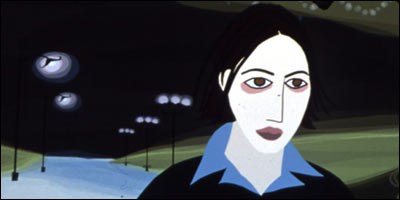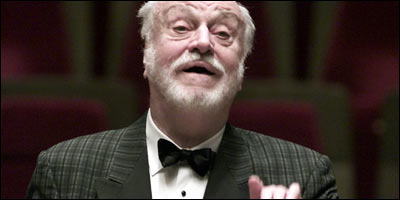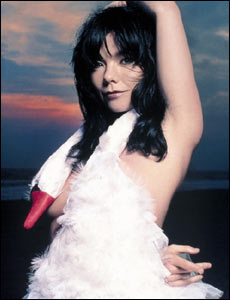
Movies
PETER RAINER
Amores Perros This powerful epic by the prodigious young Mexican director Alejandro González Iñárritu marks the arrival of a vibrant talent. Lurid and raw, the Mexico City of this film won’t be found in travel brochures.
The Circle Jafar Panahi’s fervid drama about oppressed women in Iran is a poetic political indictment of a repressive society – which may explain why it’s been banned in Iran.
The Gleaners and I Agnès Varda’s documentary about a French subculture of foragers is just as much about her catch-all, intuitive approach to filmmaking – and life.
Gosford Park Robert Altman’s best movie in years, a period murder-mystery set at an English estate, is satisfying as a whodunit but also as a whydunit that features a dream cast that includes Maggie Smith, Helen Mirren, and Alan Bates.
In the Bedroom Tom Wilkinson and Sissy Spacek play parents coping with the murder of their son in this nuanced and deeply moving directorial debut from Todd Field, who has a rare gift: He knows as much about life as he does about the camera.
Our Lady of the Assassins Barbet Schroeder’s trancelike movie, in which a writer returns to his surreally violent hometown of Medellín, Colombia, in order to extinguish himself, is perhaps his best work ever.
Sexy Beast The finest nasty movie from England in years (and they know how to do nasty over there). The thugs in this movie really sound like thugs – not some screenwriter’s idea of how thugs sound. Ray Winstone is excellent as a retired crook baking his poundage in the Spanish sun; Ben Kingsley, as his former accomplice, is a cross between Iago and the Terminator.
Shrek Not just a terrific piece of computer animation but wised-up, laugh-out-loud funny, too. You may end up liking it even more than your kids do.
The Tailor of Panama John Boorman’s adaptation of the John Le Carré political thriller is a dizzy mix of tones: a sort of slapstick Graham Greene. As the motor-mouthed, duplicitous tailor, Geoffrey Rush has never been better, which is saying something.
Waking Life Richard Linklater’s film about a young dreamer and his linked, dream-time experiences was first shot in digital video and then “painted over” by computer artists; the result is amazingly fluid, sometimes even transcendent. Linklater has a great feeling not only for philosophical banter but also the amiable bull behind it.
Theater
JOHN SIMON
Best
The Credeaux Canvas About art, its practitioners, purchasers, and parasites; and about the heart, its convolutions, connivances, and convulsions. It is even inexpensive to put on. So only the total blindness and deafness of producers can explain why Keith Bunin’s perceptive, witty, bittersweet play did not transfer.
Elaine Stritch: At Liberty Stritch is only one woman, but what she did or didn’t do – her triumphs and bloopers – seems to cover 50 years of our theatrical history. She is by turns rib-tickling, gut-splitting, and heart-wrenching.
Lobby Hero Even second-best Kenneth Lonergan has all of Neil Simon’s wit along with a surer sense of construction, a finer ear for how we talk now, and an unsentimental but compassionate feel for confused but endearing bumblers.
The Spitfire Grill Here, alas, the reviewers were at fault for not spotting, under some minor imperfections, an intimate musical whose heart and ear were very much in the right place. Simplifying the movie on which it was based, this tale about second chances and overcoming small-town prejudice would have been a genuine crowd-pleaser.
The Syringa Tree A one-woman show whose author-performer, Pamela Gien, managed to encapsulate a world: the grim history of apartheid as seen through the eyes of a bright little white girl growing into a brilliant young woman.
Worst
Chuckmeesery You can count on Charles L. Mee for pretentious, hollow, kinky leachings off Greek drama or second-childhood pornography in his pseudo-trilogy First Love, True Love, and Big Love.
Harold Pinter retrospective H.P. is not only a phony in himself but also the cause of phoniness in his epigones. Clever productions and good acting, imported from England, should not disguise Pinter’s emptiness, mean-spiritedness, and tiresome repetitiveness.
The Play About the Baby There is a good Albee, but this was by Edward’s worthless twin, with nothing up his sleeve except obfuscatory arrogance. It is all meaningless attitudinizing; not only were there no new clothes, there wasn’t even an emperor.
Thou Shalt Not Zola’s novel – material unfit for a musical – brought out the worst in everyone involved: The oppressive claustrophobia of the tale was not so much conveyed as imposed on the viewer.
Topdog/Underdog Two gifted actors (Don Cheadle and Jeffrey Wright) do not a winner make. Suzan-Lori Parks’s play about two brothers and three-card monte was itself a con game.

Television
JOHN LEONARD
Behind the Veil, in which Saira Shah, the British-born daughter of an Afghan intellectual, reported on Taliban terror – women shot to death in a football stadium for adultery, men hanged from goal posts for homosexuality, the secret schools for girls, the clerics as proud as Pol Pot – just a couple of weeks before most of America cared (CNN).
Buffy the Vampire Slayer, by which, of course, I mean the Musical, wherein all the characters sang and danced their darkest secrets, as if Sondheim had teamed up with Dracula to do Our Town (UPN).
Laughter on the 23rd Floor, with Richard Benjamin directing Nathan Lane in Neil Simon’s play, captured the neurotic genius of Sid Caesar and all those famous comedy writers for Your Show of Shows, like Simon, Mel Brooks, Woody Allen, Larry Gelbart, and Carl Reiner (Showtime).
Nero Wolfe, with Maury Chaykin as the great detective and Timothy Hutton as his smart-mouth sidekick Archie, re-created Rex Stout’s world of fine food, imported beer, rare orchids, strong opinions, and vile acts almost perfectly in one of the year’s best series (April, A&E).
New York: A Documentary Film The four concluding hours of Ric Burns’s magnificent televisual account of the port city over four centuries and its embodiment of the idea of a freely chosen future reminded us that all a terror bombing can do to this idea is scatter it like seeds, from which we’ll grow more towers (PBS).
Saving Elián, a nuanced retrospective on the international custody case from tireless Frontline producer Ofra Bikel, touched every base from the little boy’s high-seas rescue by dolphins to Fidel Castro’s pep rallies to Janet Reno and her predawn raid on Elián’s camera-loving relatives, with special emphasis on the political clout of Miami’s Cuban community (PBS).
Six Feet Under, among its many other subversive virtues, introduced most of us to the marvelous Rachel Griffiths as Peter Krause’s difficult girlfriend in a series about a family of morticians who face up to bizarre death by everything from swimming pool to cookie-dough mixer (HBO).
Things Behind the Sun, with Kim Dickens, Don Cheadle, Gabriel Mann, Elizabeth Peña, Eric Stoltz, and CCH Pounder, brought Allison Anders’s lacerating film about gang rape by high-school boys to a home screen almost too small to contain its furious complications (Showtime).
Twilight: Los Angeles was a brilliant account of the 1992 insurrection after the Rodney King verdict. With Anna Deavere Smith impersonating everyone from a black teenager to a Korean grocer to a Latino journalist to a Hollywood agent to police chief Daryl Gates, gun-toting Charlton Heston, and grandly operatic Jessye Norman (PBS).
Wit, Mike Nichols’s TV adaptation of Margaret Edson’s Pulitzer Prize-winning play starred Emma Thompson as a cancer-stricken professor of seventeenth-century poetry, Eileen Atkins as her ghostly mentor, Audra McDonald as the nurse who gave her baby oil and a Popsicle, and Harold Pinter as the father who encouraged her to read Beatrix Potter (HBO).
Classical Music
PETER G. DAVIS
Cecilia Bartoli sings Gluck arias On her latest disc from Decca, Bartoli investigates eight unknown but consistently captivating Italian arias by this great eighteenth-century composer, and her vocal virtuosity has never been more spectacular.
Chicago Symphony Orchestra A refreshing alternative to the surface brilliance of James Levine’s Wagner at the Met, Daniel Barenboim’s searching, committed, and at times incandescent concert performance of Tristan und Isolde at Carnegie Hall was a revelation. Ditto soprano Waltraud Meier as she explored every facet of Isolde’s conflicted personality.
The Flying Dutchman The City Opera seldom tackles Wagner, but this compelling new production staged by Stephen Lawless and conducted by George Manahan suggests that the company should try more often. In the title role, Mark Delavan found the perfect vehicle for his burly, wide-bore baritone.
The Gambler Prokofiev’s coruscating first opera is a gripping Dostoevskian tale of obsessives, sadists, spiteful snobs, and self-destructive neurotics. The Metropolitan’s splendid new production, directed by Temur Chkheidze and conducted by Valery Gergiev, mirrored the opera’s sardonic manner and frantic pace exactly and augurs well for the company’s upcoming production of the same composer’s monumental War and Peace.
A Great Day in New York That’s what they called it when no fewer than 52 composers, each in some way connected with the city, somehow managed to gather and pose for a group picture and later attend a grand festival of their music sponsored by the Chamber Music Society of Lincoln Center. May the warm spirit of solidarity generated by these concerts continue.
Hans Werner Henze’s Symphony No. 9 A shattering choral symphony, born of Henze’s bitter memories of Nazi Germany and conscription into the army as a teenager, this is one of the many new works performed by the New York Philharmonic during Kurt Masur’s tenure that seem guaranteed to last.
Les Huguenots The Opera Orchestra of New York has been reviving rarities and introducing important new singers for years, seldom achieving more exciting results than with this once extravagantly popular French grand opera. With Eve Queler conducting, and tenor Marcello Giordani and soprano Krassimira Stoyanova in top form, Giacomo Meyerbeer’s historical epic once again seemed like an important opera.
Kodo These drummers from Japan arrived at Carnegie Hall and, inspired by the shapes and sizes of their many intriguing instruments as well as by the rhythms and dynamics of the music they play, performed with an athletic grace that was positively hypnotic. In Japanese, kodo means heartbeat, which perhaps explains the gut appeal of this remarkable ensemble.
The Makropulos Case Like the heroine of Janácek’s opera, German Kunstdiva Anja Silja refuses to grow old, and her impersonation of Emilia Marty, a 337-year-old woman who learns to accept mortality and embrace death, is a tour de force. The mesmerizing Glyndebourne production came to bam last winter, and Silja’s performance, characteristically physical, fearless, and self-revealing, improves with age.
Kurt Masur at the New York Philharmonic To honor departing music director Kurt Masur, the Philharmonic has issued a handsomely packaged ten-CD boxed set of live performances highlighting Masur’s eleven-year reign. Taking pride of place is the maestro’s eloquent interpretation of Bach’s mighty Saint Matthew Passion.

Pop Music
ETHAN BROWN
Avalanches, Since I Left You (London-Sire). Good record collections have been given a bad name by rare-groove snobs and narrow-minded hip-hop classicists like D.J. Premier. But like De La Soul and D.J. Shadow before them, the Avalanches capture the sheer bliss of skipping through genres, searching for the perfect beat.
Basement Jaxx, Rooty (Astralwerks). Impatient with boundaries in the best possible way, the U.K. house-music duo Basement Jaxx mixes everything from Minneapolis funk to two-step garage into its second album and creates some of the most exuberant party music since Parliament’s mother ship first landed.
Björk, Vespertine (Elektra). The Björk album for on-the-fence fans like me: All the elfin joie de vivre and twinkling soundscapes without the overt whimsy or irksome kitsch.
Blaze, Natural Blaze (Lifeline). Soulful house slipped into self-parody this year, all precious solos and odes to “deepness.” But the New Jersey house duo Blaze maintains a multi-instrumental groove without falling into fastidiousness. They’re more Earth Wind and Fire than Body & Soul.
Bob Dylan, Love and Theft (Columbia). Dylan can be cranky and conservative (he told the Los Angeles Times he “wouldn’t even think about playing music if I were born in these times”), but Love and Theft has ease, humor, and the pure country swing of The Basement Tapes.
Missy Elliott, Miss E … So Addictive (Elektra). The lyrics cover well-traveled hip-hop territory – insufficient lovers, excessive partying, outsize joints – but the beats (mostly from producer Timbaland) are so radical that even electronica’s fringe can’t quite keep up.
Fischerspooner, #1 (International Deejay Gigolos). Half D.J. duo and half art-school project, Fischerspooner brings the eighties back to the future with dazzling sonics and a sly, sexy sense of clubland decadence.
The Horrorist, Manic Panic (Things to Come). A grimly hilarious trip through rave culture’s underbelly. Imagine The Gangs of New York as written by the Prodigy.
Prince, The Rainbow Children (NPG/ Redline). A glorious mess, Children features rambling jazz fusion and indecipherable political commentary – but also flashes of genius not seen since Sign o’ the Times.
The Strokes, Is This It (RCA). They’re despised by indier-than-thou sourpusses for their distinctly un-punk lineage. But the hooks are everywhere.
Books
DANIEL MENDELSOHN
Austerlitz, by W. G. Sebald. The German-born writer explores the mysteries of guilt and identity in a densely textured tour de force about a Welsh preacher’s son who finds out he’s really the child of Czech Jewish Holocaust victims.
Bel Canto, by Ann Patchett. A hypnotic fable about an opera singer who seduces a group of South American terrorists into a new appreciation of what beauty means.
Borrowed Finery, by Paula Fox. Too long neglected, the Brooklyn-based novelist and author of numerous children’s books hits it big with a memoir that, like so much of her work, combines hawk-eyed perceptions, total lack of sentiment, and deep (but never cheap) emotion.
Collected Poems, by James Merrill. The late, great American master’s collected shorter poems prove that his real epic wasn’t the Ouija-board “Sandover” trilogy but the flawless lyrics in which he wrote about – well, just about everything.
The Corrections, by Jonathan Franzen. Oprah, shmoprah – this sprawling epic of a midwestern family’s disintegration is the real thing: an important American novel that sums up the tragedy – and comedy – of late-twentieth-century American life.
How I Came Into My Inheritance, by Dorothy Gallagher. This small but fierce (and fiercely funny) memoir by the New York writer of an unconventional youth never yields to sentimentality – but the uncompromising ferocity is mixed, winningly, with tenderness.
The Rock, by Kanan Makiya. In this first novel by the distinguished Iraqi-born architect and journalist, the story of how the Dome of the Rock got built provides a perfect vehicle for exploring the origins of Arab-Jewish-Christian hostility.
Seabiscuit, by Laura Hillenbrand. A biography of a racehorse? You betcha. Hillenbrand’s rich and often gripping account of a short, squat underdog’s improbable transformation into a national icon will have all secret Cinderellas at the edge of their seats.
The Shadow of the Sun, by Ryszard Kapuscinski. The brilliant Polish journalist and author of devastating accounts of the fall of the Shah and of Haile Selassie turns his attention to the whole continent of Africa, creating a searingly wry and insightful portrait of a continent – and colonialism.
Theodore Rex, by Edmund Morris. Morris had to write a quasi novel to give Ronald Reagan some depth and substance; no need for that here. You can almost hear the author sigh with relief to have a subject as interesting – and substantive – as Teddy Roosevelt.